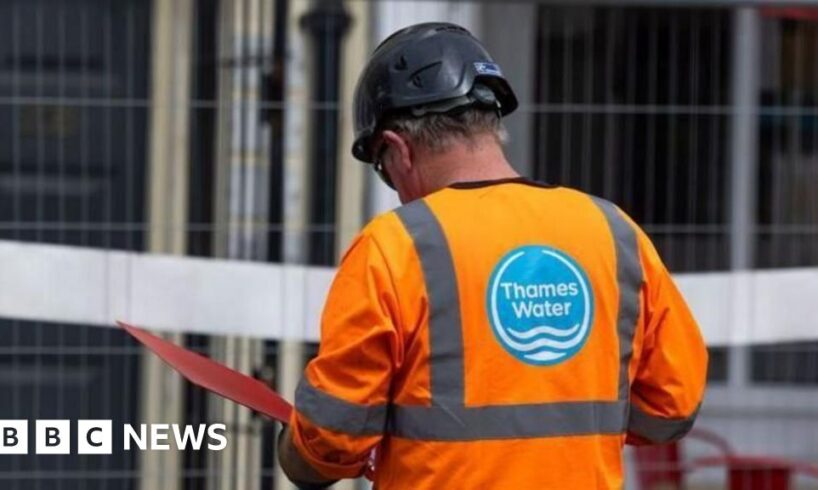
Thames Water’s lenders have submitted a new rescue plan to prevent the UK’s largest water company from collapsing.
London & Valley Water, a consortium of large financial institutions and investors, has submitted proposals which include writing off about a third of the company’s near £20bn debt pile and investing an initial £5.4bn to stabilise its finances.
Fears that Thames could collapse first emerged more than two years ago, and the government has been on standby to supervise a form of temporary nationalisation.
But the firm’s investors said its plan would rebuild the company without the need for any taxpayer funding or government support.
The company serves about a quarter of the UK’s population, mostly across London and parts of southern England, and employs 8,000 people.
But it has faced heavy criticism over its performance in recent years over a series of sewage discharges and pipe leaks. In May, it was handed a £122.7m fine, the biggest ever issued by the water industry regulator, for breaching rules on sewage spills and shareholder payouts.
London & Valley Water said on Thursday that its plan was the “fastest and most reliable route” to turn around Thames, clean up waterways and rebuild public trust.
Investors said they would inject an initial £5.4bn into the company to shore up its finances and support future investment, but they suggested the cash injection needed to be set against “stretching but achievable and realistic performance targets”.
All water companies are subject to performance targets over leaks, pollution incidents and customer satisfaction levels.
London & Valley has argued the current targets in place for the company are unachievable and its current business plan needs to be adjusted in order for Thames to attract future investment, rebuild the company and improve its performance for customers.
But Mike Keil, chief executive of the Consumer Council for Water which represents billpayers, said Thames “should not receive special treatment around performance targets at a time when customers are paying more and have a right to expect more for their money”.
He said recent customer complaints showed Thames had made “some progress, but remains among the industry’s worst performers and is the country’s least trusted water company”.
“The acid test of this proposed rescue plan is whether it would actually deliver improvements for Thames Water customers, many of whom are fed up with receiving a poor service,” he added.
Liberal Democrat MP Charlie Maynard, who appealed against a previous rescue loan for Thames that was eventually approved by the High Court earlier this year, said the creditors’ plan was a “terrible deal”.
“The government must bite the bullet – put Thames Water into special administration with a swift exit which finally puts customers first, under mutual ownership.”
London & Valley said under its proposals no dividends would be paid out to shareholders over the duration of the turnaround plan and that new shareholders would commit not to sell the business prior to March 2030.
Outstanding fines would also be paid, they added.
London & Valley Water said it aimed to reach an agreement with Thames and water industry regulator Ofwat “as quickly as possible this autumn given the urgent need to stabilise Thames Water”.
A government spokesperson said it was ready “for all eventualities”, including a situation in which the company collapsed into administration.
“The government will always act in the national interest on these issues,” they added.
Mike McTighe, the proposed future chair of Thames Water under the terms of plan, said “from day one, we will inject billions in new investment”.
He added that under a new company board, there would be a focus on “reducing pollution and rebuilding public trust so that by the end of this decade Thames Water can once again be a reliable, resilient, and responsible company”.
Ofwat said it would review the latest plans.
In response to the proposals, Chris Weston, chief executive of Thames Water, said the announcement marked an “important milestone” in the company’s work to resolve its debt problems and secure its finances to “support the investment and performance improvements our customers expect”.
The revised turnaround proposals come after Thames suffered a major blow in its attempt to secure its future this summer when US private equity firm KKR pulled out of a £4bn deal.
In July, the boss of Thames Water, Chris Weston, said the company was “extremely stressed” and that it would take “at least a decade to turn around”.
Water bills for households in England and Wales have risen by £10 per month on average this year, although costs vary depending on suppliers. The bills for Thames Water’s customer have gone up from £488 to £639 a year on average.





